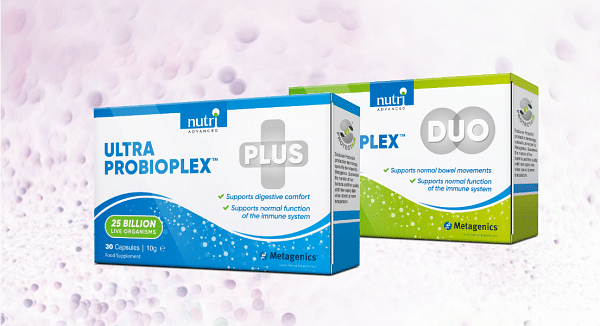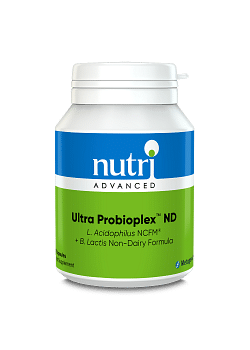6 Simple Steps To Nurture Your Gut
Why you can trust Nutri Advanced Every article on our site is researched thoroughly by our team of highly qualified nutritionists. Find out more about our editorial process.
1. Feed the good – Just like us, beneficial bacteria need food to survive, so you need to make sure you feed them! They thrive on a diet rich in wholefoods, fruits and vegetables so include plenty of these in your diet. Foods for beneficial bacteria are known as ‘prebiotics’. Particularly useful prebiotic foods include asparagus, bananas, onions, garlic, cabbage, chicory root, dandelion greens, beans and lentils, wholegrains, artichokes, root vegetables and apples. Blackberry extract is being hailed as the newest gut superfood and has been shown in research to have prebiotic qualities.
2. Starve the bad – At the same time as feeding the good guys, it’s important to reduce foods that will fuel the unhealthy organisms. Avoid sugar, alcohol, caffeine, refined and processed foods.
3. Probiotic-rich foods – As well as feeding the good guys and starving the bad, you need to consume foods which contain naturally high levels of probiotic organisms. Live yoghurt is the obvious choice, however there is a range of foods, which are far superior to this when it comes to supporting your gut microflora. Fermented foods such as kefir, kimchi, tempeh, natto, lassi, sauerkraut and kombucha naturally contain high levels of a variety of beneficial bacteria and are a great addition to your daily diet. Whilst you can make your own fermented foods, there are some great ready-made kombucha, kefir and kimchi products available commercially, that you can use to save time.
4. Probiotic supplement – A daily probiotic supplement is now considered to be as important for your health as a daily multivitamin & mineral. Choose a probiotic supplement that contains scientifically proven strains to ensure it will be effective. Well-researched strains include Lactobacillus acidophilus NCFM®, Lactobacillus paracasei Lpc-37, Bifidobacterium lactis Bi-04, Bifidobacterium lactis Bi-07 & Saccharomyces boulardii. It is also important that your probiotic can demonstrate that it can survive the stomach acid and reach the intestines intact, otherwise it will be ineffective.
5. Antibiotics only when necessary – Antibiotics wipe out both good and bad bacteria so it’s important to take them only when necessary. If you do need to take antibiotics however, make sure you follow up with a high strength probiotic supplement containing scientifically proven strains to replenish your beneficial gut microflora. In addition, be particularly vigilant with your diet both during and after antibiotics. Consume plenty of prebiotic foods that will help the good bacteria to repopulate and avoid refined, sugary foods to limit the growth of unhealthy microorganisms.
6. Minimise exposure to environmental & lifestyle factors – And last but certainly not least, friendly bacteria are highly vulnerable to damage by lifestyle and environmental factors. Chlorinated and fluoridated water, antibacterial soaps, agricultural chemicals and pesticides, pollution, stress, noise and food additives can all be harmful to gut microflora. Assess your exposure to these factors and take steps to minimise where possible. Incorporate regular relaxation into your lifestyle to reduce stress and support beneficial bacteria. Yoga and mindfulness are ancient techniques that have a long history of use for reducing stress and supporting overall wellbeing.
This website and its content is copyright of Nutri Advanced ©. All rights reserved. See our terms & conditions for more detail.
Nutri Advanced has a thorough research process and for any references included, each source is scrutinised beforehand. We aim to use the highest value source where possible, referencing peer-reviewed journals and official guidelines in the first instance before alternatives. You can learn more about how we ensure our content is accurate at time of publication on our editorial policy.
Most Popular Articles
-
7 Surprising Ways To Support Your Magnesium
If you are displaying signs of a magnesium deficiency, here are 7 ways to boost your magnesium levels that are easy to incorporate into your daily life. -
5 Best Vitamin C Supplements Picked By Our Experts
Learn more about the different types of vitamin C, the different benefits you get from different types, and what you get for spending more on a good supplement. -
Top 5 Vitamins For Energy And Tiredness Picked By Our Experts
The 5 best and most important vitamins for energy & tiredness including B vitamin food sources & best supplement forms for energy. -
Benefits of Myo-Inositol for Polycystic Ovary Syndrome (PCOS)
In this research review article, we take a closer look at a lesser-known natural compound called myo-inositol that has been found to have significant potential to improve many of the prevalent features of PCOS. -
Top 10 Reasons to Give Your Kids Omega-3
Read the top 10 reasons that kids should have plenty of Omega-3- an essential fatty acid- including for depression, brain function, sleep & reading/maths skills.















